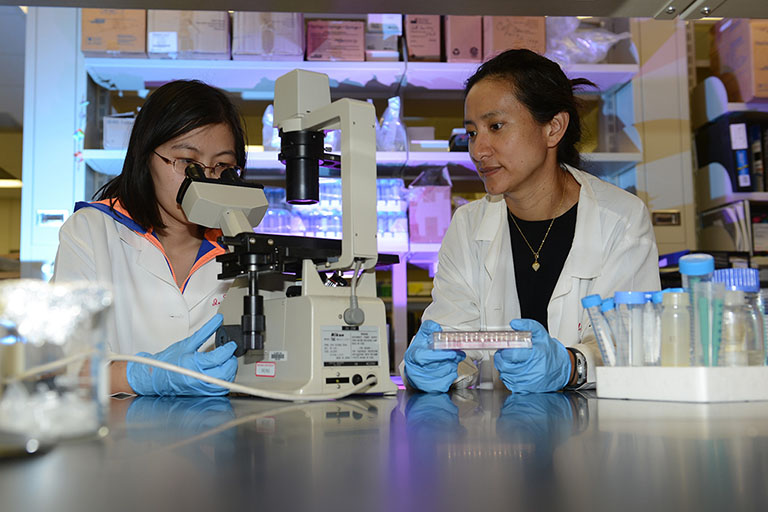Deep expertise across every cancer discipline
The four collaborative research programs at IU Simon Comprehensive Cancer Center take our deep expertise across every discipline and apply it to basic science, clinical trials, and outreach initiatives.
The four collaborative research programs at IU Simon Comprehensive Cancer Center take our deep expertise across every discipline and apply it to basic science, clinical trials, and outreach initiatives.

Our investigations focus on understanding the molecular changes that cause cancer, and developing targeted therapies to prevent and treat it.
In other words, we know #ResearchCuresCancer—and we’re proving it every day.
The cancer: Neurofibromatosis, a genetic mutation that leads to disfiguring and life-threatening disorders, mainly in children.
The principal investigator: Dr. D. Wade Clapp, a member of the Tumor Microenvironment and Metastasis research program.
The grant: $12 million from the NCI’s Specialized Programs of Research Excellence (SPORE) to study NF1, the most common inherited cancer predisposition syndrome.
The goal: Use the complete genetic sequence of the research participants to design precise treatments, adopt new research techniques, and better understand how tumors develop resistance to drugs.





Inaugural Vera Bradley Foundation Scholar in Breast Cancer Discovery
Read MoreHaggstrom DA, Carr T. Uses of Personal Health Records for Communication Among Colorectal Cancer Survivors, Caregivers, and Providers: Interview and Observational Study in a Human-Computer Interaction Laboratory. JMIR Hum Factors. 2022 Jan 25;9(1):e16447. doi: 10.2196/16447. PMID: 35076406; PMCID: PMC8826153.
Mijit M, Wireman R, Armstrong L, Gampala S, Hassan Z, Schneeweis C, Schneider G, Zhang C, Fishel ML, Kelley MR. RelA Is an Essential Target for Enhancing Cellular Responses to the DNA Repair/Ref-1 Redox Signaling Protein and Restoring Perturbated Cellular Redox Homeostasis in Mouse PDAC Cells. Front Oncol. 2022 Mar 24;12:826617. doi: 10.3389/fonc.2022.826617. PMID: 35402225; PMCID: PMC8988139.
Song Q, Bates B, Shao YR, Hsu FC, Liu F, Madhira V, Mitra AK, Bergquist T, Kavuluru R, Li X, Sharafeldin N, Su J, Topaloglu U. Risk and Outcome of Breakthrough COVID-19 Infections in Vaccinated Patients With Cancer: Real-World Evidence From the National COVID Cohort Collaborative. J Clin Oncol. 2022 May 1;40(13):1414-1427. doi: 10.1200/JCO.21.02419. Epub 2022 Mar 14. PMID: 35286152; PMCID: PMC9061155.
Ballinger TJ, Jiang G, Shen F, Miller KD, Sledge GW Jr, Schneider BP. Impact of African ancestry on the relationship between body mass index and survival in an early-stage breast cancer trial (ECOG-ACRIN E5103). Cancer. 2022 Jun 1;128(11):2174-2181. doi: 10.1002/cncr.34173. Epub 2022 Mar 14. PMID: 35285940; PMCID: PMC9086123.
Johnson TS, Yu CY, Huang Z, Xu S, Wang T, Dong C, Shao W, Zaid MA, Huang X, Wang Y, Bartlett C, Zhang Y, Walker BA, Liu Y, Huang K, Zhang J.Diagnostic Evidence GAuge of Single cells (DEGAS): a flexible deep transfer learning framework for prioritizing cells in relation to disease. Genome Med. 2022 Feb 1;14(1):11. doi: 10.1186/s13073-022-01012-2. PMID: 35105355; PMCID: PMC8808996.
Shugg T, Ly RC, Rowe EJ, Philips S, Hyder MA, Radovich M, Rosenman MB, Pratt VM, Callaghan JT, Desta Z, Schneider BP, Skaar TC. Clinical Opportunities for Germline Pharmacogenetics and Management of Drug-Drug Interactions in Patients With Advanced Solid Cancers. JCO Precis Oncol. 2022 Feb;6:e2100312. doi: 10.1200/PO.21.00312. PMID: 35201852.